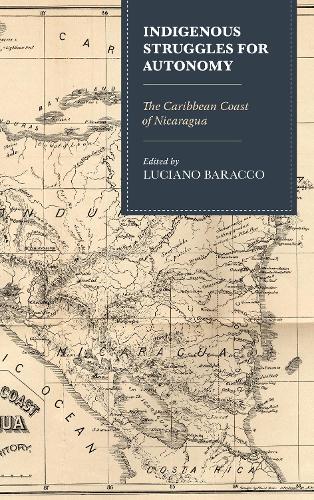
Indigenous Struggles for Autonomy: The Caribbean Coast of Nicaragua
(Hardback)
Publishing Details
Indigenous Struggles for Autonomy: The Caribbean Coast of Nicaragua
By (Author) Luciano Baracco
Contributions by Govand Khalid Azeez
Contributions by Luciano Baracco
Contributions by Arelly Barbeyto
Contributions by Dolores Figueroa Romero
Contributions by Jane Freeland
Contributions by Alejandra Gaitn-Barrera
Contributions by Miguel Gonzlez
Contributions by Colette Grinevald
Contributions by Mark Jamieson
Bloomsbury Publishing PLC
Lexington Books
29th November 2018
United States
Classifications
Professional and Scholarly
Non Fiction
972.853
Physical Properties
Hardback
246
Width 162mm, Height 231mm, Spine 21mm
513g
Description
Indigenous Struggles for Autonomy: The Caribbean Coast of Nicaragua offers a broad and comprehensive analysis of Nicaraguas Caribbean Coast and the process of autonomy that was initiated in 1987 as part of a wider conflict resolution process during the years of the Sandinista revolution and has continued through to the present day. Over its 30 year period of development, the autonomy process on Nicaraguas Caribbean Coast can be seen as a crucible for the autonomous struggles of minority peoples throughout the Latin American continent. Autonomy on Nicaraguas Caribbean Coast remains highly contested, being simultaneously characterized by progress, setbacks, and violent confrontation within a number of fields and involving a multiplicity of local, national, and global actors. This experience offers critical lessons for efforts around the world that seek to resolve long-established and deep-seated ethnic conflict by attempting to reconcile the need for development, usually fostered by national governments through neo-extractivist policies, with the protection of minority rights advocated by marginalized minorities living within nation states and, increasingly, by intergovernmental organizations such as the United Nations and the Organization of American States. This book presents analyses that reveal the broad implications for the struggle for autonomy on the Caribbean Coast of Nicaragua, conducted by scholars with expertise in an array of disciplines including sociology, globalization theory, anthropology, history, socio-linguistics, cultural and postcolonial studies, gender studies, and political science.
Reviews
Written by well-known specialists in the field and based on extensive fieldwork, this book offers new perspectives on the historical preconditions and current contradictions of Nicaragua's autonomy process. The book demonstrates then as now Nicaraguan governments consider the Atlantic coast primarily a source of natural resources. -- Wolfgang Gabbert, Leibniz University Hannover
Once in the eye of a colossal geopolitical storm, the Atlantic Coast of Nicaragua faded back into the margins of public awareness soon after the intense conflict of the 1980s subsided. Yet the struggle for autonomyone major factor in that conflicthas continued, with equally high stakes and lessons to be learned for similar struggles elsewhere. The post-conflict scholars of this volume offer insightful analysis of these discouraging subsequent years, along with provocative revisions of existing historical interpretations, which merit serious and sustained engagement. This book persuasively shows how Black and indigenous Nicaraguan protagonists of these struggles for autonomy, though often invisibilized and always buffeted by more powerful forces, continue to exert a profound influence on the course of Nicaraguan and Caribbean Central American history. -- Charles R. Hale, University of California, Santa Barbara
Author Bio
Luciano Baracco is associate professor in political science and international relations at the Middle East Technical University, Northern Cyprus Campus.
